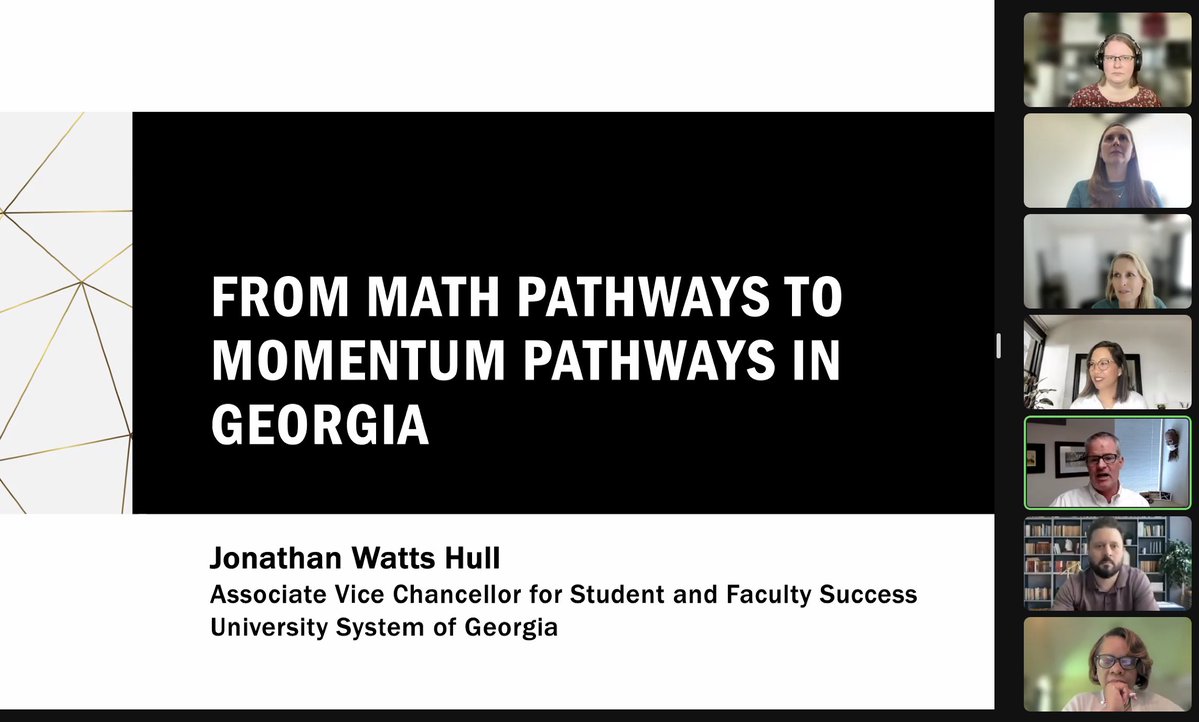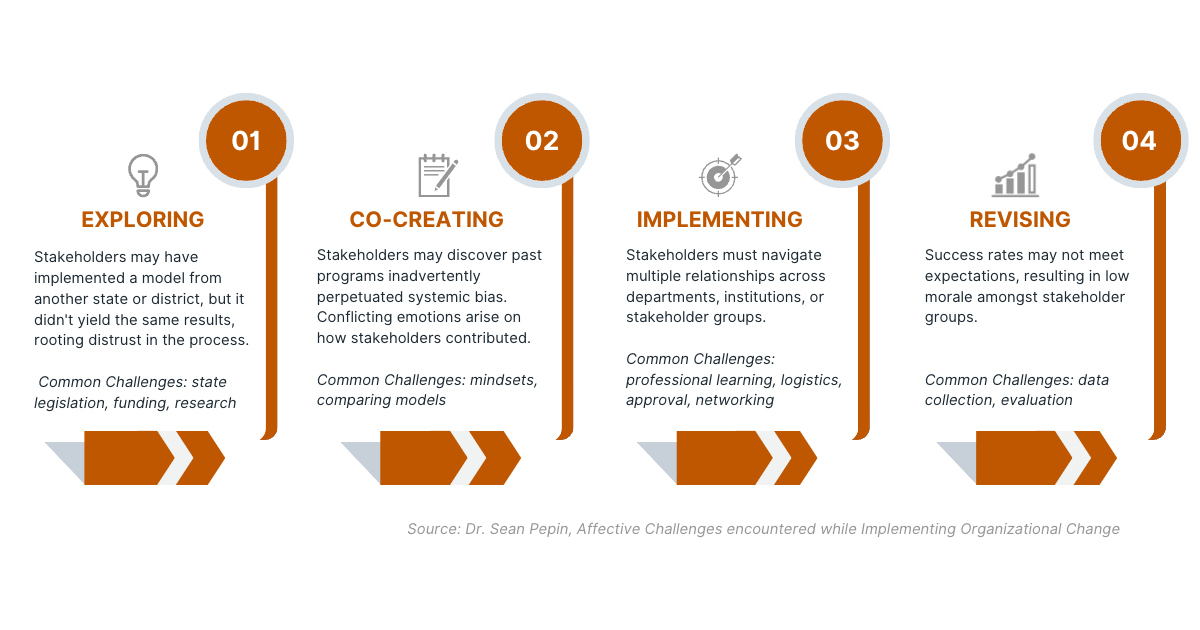
Conference Brings Educators Together to Align Math Pathways
“Aligning Math Pathways for Student Success,” a two-day virtual conference held April 11–12, 2023, welcomed education champions representing 34 states, including Washington, D.C. This conference was supported by the Launch Years Initiative.
The Launch Years Initiative is focused on mobilizing action and scaling mathematics pathways from high school through postsecondary education. Through these efforts, stakeholders hope to better serve students with access to high-quality math courses that are aligned with their career aspirations.
This conference highlighted the work happening on the ground across the country, and allowed educators time to learn and work together on the challenges faced when aligning math pathways.
Keynote Speakers
April 11, Day 1
Dr. Jonathan Hull, associate vice chancellor of student and faculty success at the University System of Georgia (USG), kicked off the conference by introducing the “Georgia Momentum Framework.”

With over 25 colleges and universities, 181 school districts, and 2,000+ public schools, USG required a new approach to math that supported both STEM and non-STEM majors.
“We had math choices, but they weren’t really math pathways,” said Dr. Hull, after recounting USG’s outdated framework. Before they fully implemented pathways, 76% of non-STEM majors took college algebra when it wasn’t required by their career paths.
For most USG students, college algebra would’ve been the last math course taken before entering the workforce which, according to Dr. Hull, makes it even more essential to ensure that it is relevant and useful.
“If 50% of your non-STEM majors are not passing college algebra, then it may not be the ‘safe’ math,” said Dr. Hull. To tackle this critical issue, USG launched the “momentum approach” in 2018 — a purposeful framework that outlines policy, practice, and culture recommendations to advise students on best practices in their first year of college.
“Allow students who have demonstrated interest in an area to explore...and discover if it’s a good fit for them without the consequence of accumulating a great deal of credit that will not apply to their program,” said Dr. Hull.
April 12, Day 2
Dr. Sean Pepin, organizational change and DEI consultant at Kheper House Consulting, revealed key insights on “Affective Challenges Encountered While Implementing Organizational Change.” After 10 years facilitating strategic planning, Dr. Pepin identified underlying causes of struggle at various stages of implementation, specifically in corequisite models.

Despite challenges, Dr. Pepin advocated for normalizing struggle as “developmentally necessary” to collectively learn and recommit to the work at hand.
“Struggle and hope are bounded dualisms,” said Dr. Pepin, after reminding participants to focus on what they can control. “No matter what level of the institution you're at, the magic sauce is the ability to convene people.”
Dr. Pepin closed with recommendations aligned with each stage of development and emphasized the importance of assessing conditions (e.g., leadership support, funding, professional learning, research and data) before getting started.
Conference Highlights
The conference included 12 consultancy sessions facilitated by Dana Center staff, where participants addressed critical issues and possible solutions in math alignment. Participants were asked to think expansively and assume that many ideas discussed would remain open.
We’ve gathered key insights for select problems of practice:
Session: Promoting Cross-System Collaboration Where It Has Not Previously Existed
Participants shared ideas on how to promote collaboration to ensure students are transferred smoothly between systems.
The session began with a participant’s leading question, “What does success in mathematics look like, and how do we all get on the same page?” Many participants felt there was a misalignment in advising practices and discussed potential solutions to mediate misinforming students.
Some Ideas
- Building Dual Enrollment Capacity and Relationships
- Launching Communications Campaigns to Reach K–12 Audiences
- Cultivating and Supporting Cross-Sector Relationships Between Key Stakeholders
Session: Supporting Faculty in Learning How to Teach Non-Cognitive Skills
Participants explored the importance of teaching non-cognitive skills in STEM as well as common misconceptions. A prevalent challenge participants struggled with was working with colleagues who did not value non-cognitive skills.
Since faculty may prefer an evidence-based reason to teach non-cognitive skills, participants suggested providing data-driven resources to staff that demonstrate why non-cognitive skills yield effective results and how to apply them in a classroom.
“What awakens curiosity is showing teachers that it has a measurable impact on student’s lives,” said Tammy Perez- Rice, course program specialist at the Dana Center.
Some Ideas
- Continuous Professional Learning
- Curriculum with Built-in Supports
- Faculty Discussion Boards (e.g., Slack channel)
- Book Clubs
- Easily Accessible How-to Guides
Session: Dealing with “Learning Loss” for High School Students
Participants discussed how to get high school students back on track when significant learning gaps presented challenges as a result of the pandemic.
“Students are in survival mode from COVID,” shared one participant. Some critical issues explored were lack of standard completion, classroom discipline, and how many students “have forgotten how to attend school and learn in a community.”
On a positive note, participants shared how students and teachers became more adept during the pandemic, particularly at using technology.
“It’s the teacher’s responsibility to dig for what a student knows, and then bridge those funds of knowledge to grade-level content. All students know something!” said Lindsey Henderson, a secondary mathematics specialist from Utah’s Board of Education.
Some Ideas
- Collaboration Among Teachers and Across Grade Bands
- Prioritizing Broad Application Course Content
- Developing Instructional Skills for Just-in-Time Learning
Session: Strategies for Changing Faculty Mindsets about Student Learning
This session opened with a thought-provoking prompt:
“We often hear faculty say that their students just can’t learn certain things, or that some students aren’t meant for STEM. How can we promote an asset-minded view and help faculty believe that all of their students can succeed?”
There was a general consensus that resistance to change contributed to the problem, and that perhaps faculty identified too closely to the idea that they were “math people” to adapt a growth mindset in which everyone could be successful.
Some Ideas
- Using Asset-Based Vocabulary
- Growth Mindset Workshops
- Data Insights on Student Ability
Interested in learning more about the Launch Years Initiative? Sign up for our newsletter to get the latest updates, briefs, and insights on math alignment across sectors.
Get in Touch
How can the Dana Center work with you to ensure that our nation's students are ready for postsecondary education and the contemporary workforce?
